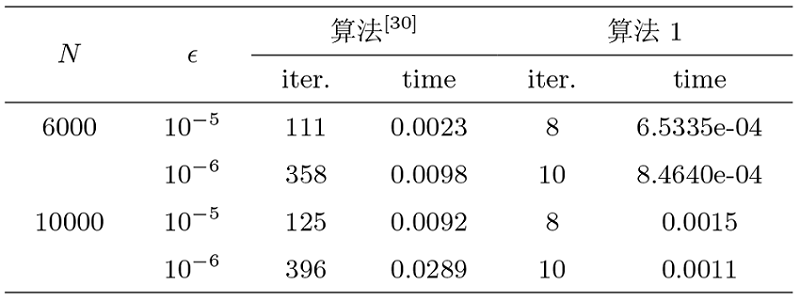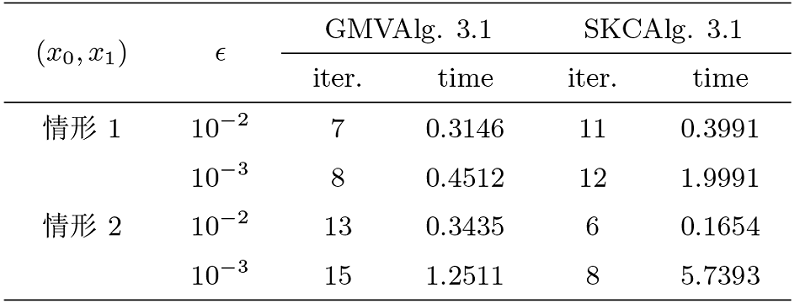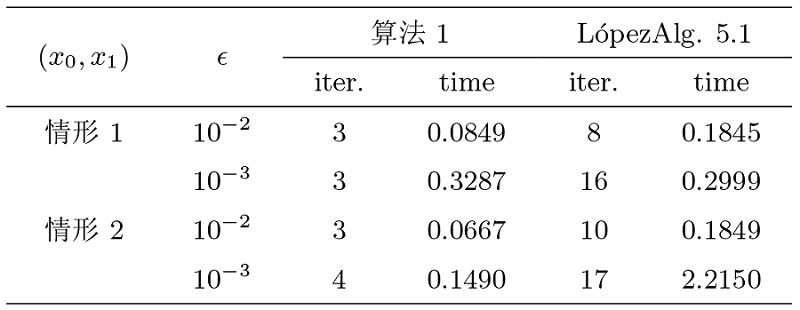| [1] |
Abbas M, Alshahrani M, Ansari Q H, et al. Iterative methods for solving proximal split minimization problems. Numer Algorithms, 2018, 78: 193-215
|
| [2] |
Anh P K, Vinh N T, Dung V T. A new self-adaptive CQ algorithm with an application to the lasso problem. J Fixed Point Theory Appl, 2018, 20: Article 142
|
| [3] |
Byrne C. Iterative oblique projection onto convex sets and the split feasibility problem. Inverse Problems, 2002, 18: 441-453
|
| [4] |
Byrne C. A unified treatment of some iterative algorithms in signal processing and image reconstruction. Inverse Problems, 2004, 20: 103-120
|
| [5] |
Censor Y, Elfving T. A multiprojection algorithm using Bregman projection in a product space. Numer Algorithms, 1994, 8: 221-239
|
| [6] |
Censor Y, Elfving T, Kopf N, Bortfeld T. The multiple-sets split feasibility problem and its applications for inverse problems. Inverse Problems, 2005, 21: 2071-2084
|
| [7] |
Chuang C S. Hybrid inertial proximal algorithm for the split variational inclusion problem in Hilbert spaces with applications. Optimization, 2017, 66: 777-792
|
| [8] |
Combettes P L, Hirstoaga S A. Equilibrium programming in Hilbert spaces. J Nonlinear Convex Anal, 2005, 6: 117-136
|
| [9] |
Combettes P L, Pesquet J C. Proximal splitting methods in signal processing//Bauschke H, Burachik R, Combettes P, et al. Fixed-Point Algorithms for Inverse Problems in Science and Engineering. New York: Springer, 2011: 185-212
|
| [10] |
Combettes P L, Wajs V R. Signal recovery by proximal forward-backward splitting. Multiscale Model Simul, 2005, 4: 1168-1200
|
| [11] |
Dong Q L, He S, Rassias M T. General splitting methods with linearization for the split feasibility problem. J Glob Optim, 2021, 79: 813-836
|
| [12] |
Dong Q L, Tang Y C, Cho Y J, Rassias Th M. “Optimal” choice of the step length of the projection and contraction methods for solving the split feasibility problem. J Global Optim, 2018, 71: 341-360
|
| [13] |
Gibali A, Liu L W, Tang Y C. Note on the modified relaxation CQ algorithm for the split feasibility problem. Optim Lett, 2018, 12: 817-830
|
| [14] |
Gibali A, Mai D T, Vinh N T. A new relaxed CQ algorithm for solving split feasibility problems in Hilbert spaces and its applications. J Ind Manag Optim, 2019, 15: 963-984
doi: 10.3934/jimo.2018080
|
| [15] |
Goebel K, Reich S. Uniform Convexity, Hyperbolic Geometry, and Nonexpansive Mappings. New York: Marcel Dekker, 1984
|
| [16] |
Kesornprom S, Cholamjiak P. Proximal type algorithms involving linesearch and inertial technique for split variational inclusion problem in hilbert spaces with applications. Optimization, 2019, 68(12): 2369-2395
|
| [17] |
Kesornprom S, Pholasa N, Cholamjiak P. On the convergence analysis of the gradient-CQ algorithms for the split feasibility problem. Numer Algorithms, 2002, 84: 997-1017
|
| [18] |
Lions P L, Mercier B. Splitting algorithms for the sum of two nonlinear operators. SIAM J Numer Anal, 1979, 16: 961-979
|
| [19] |
López G, Martin V, Wang F, Xu H K. Solving the split feasibility problem without prior knowledge of matrix norms. Inverse Problems, 2012, 28: 085004
|
| [20] |
Ma X, Liu H, Li X. The iterative method for solving the proximal split feasibility problem with an application to LASSO problem. Computational and Applied Mathematics. 2022, 41(1): Article 5
|
| [21] |
Moudafi A. Viscosity approximation methods for fixed points problems. J Math Anal Appl, 2000, 241: 46-55
|
| [22] |
Moudafi A, Thakur B S. Solving proximal split feasibility problems without prior knowledge of operator norms. Optim Lett, 2014, 8: 2099-2110
|
| [23] |
Osilike M O, Aniagbosor S C. Weak and strong convergence theorems for fixed points of asymptotically nonexpansive mappings. Math Comput Modelling, 2000, 32: 1181-1191
|
| [24] |
Qu B, Xiu N. A note on the CQ algorithm for the split feasibility problem. Inverse Problems, 2005, 21: 1655-1665
|
| [25] |
Reich S, Tuyen T M, Ha M T N. An optimization approach to solving the split feasibility problem in Hilbert spaces. J Glob Optim, 2021, 79: 837-852
|
| [26] |
Saejung S, Yotkaew P. Approximation of zeros of inverse strongly monotone operators in Bachna spaces. Nolinear Analysis, 2012, 75: 742-750
|
| [27] |
Sahu D R, Cho Y J, Dong Q L, et al. Inertial relaxed CQ algorithms for solving a split feasibility problem in Hilbert spaces. Numer Algorithms, 2021, 87: 1075-1095
|
| [28] |
Shehu Y, Gibali A. New inertial relaxed method for solving split feasibilities. Optim Lett, 2021, 15: 2109-2126
|
| [29] |
Shehu Y, Iyiola O S. Strong convergence result for proximal split feasibility problem in Hilbert spaces. Optimization, 2017, 12: 2275-2290
|
| [30] |
Shehu Y, Iyiola O S. Accelerated hybrid viscosity and steepest-descent method for proximal split feasibility problems. Optimization, 2018, 67: 475-492
|
| [31] |
Shehu Y, Iyiola O S. Convergence analysis for the proximal split feasibility problem using an inertial extrapolation term method. J Fixed Point Theory Appl, 2017, 19: 2483-2510
|
| [32] |
Suantai S, Pholasa N, Cholamjiak P. The modified inertial relaxed CQ algorithm for solving the split feasibility problems. J Ind Manag Optim, 2018, 23: 1595-1615
|
| [33] |
Thong D V, Dung V T, Cho Y J. A new strong convergence for solving split variational inclusion problems. Numer Algorithms, 2021, 86: 565-591
|
| [34] |
Tseng P. A modified forward-backward splitting method for maximal monotone mappings. SIAM J Control Optim, 2000, 38: 431-446
|
| [35] |
Wang Y, Xu H K. Strong convergence for the proximal gradient method. J Nonlinear Convex Anal, 2014, 15: 581-593
|
| [36] |
Yen L H, Huyen N T T, Muu L D. A subgradient algorithm for a class of nonlinear split feasibility problems: Application to jointly constrained Nash equilibrium models. J Global Optim, 2019, 73: 849-868
|
| [37] |
Yen L H, Muu L D, Huyen N T T. An algorithm for a class of split feasibility problems: Application to a model in electricity production. Math Methods Oper Res, 2016, 84: 549-565
|
 )
)




